Best Marketing Automation Software for 2025
Marketing automation software helps businesses streamline and automate tasks like email campaigns, social media scheduling, and lead management. It saves time, boosts engagement, and makes scaling marketing efforts easier.
Why You Can Trust the Expertise of Sonary
At Sonary, we are committed to providing accurate and trustworthy information to help you make informed decisions. Our research process is meticulous, transparent, and guided by a dedication to maintaining the highest standards of integrity, ensuring accurate, real-world insights.
Read more
Unlike many other review platforms, we conduct in-depth evaluations of the software and services we feature. Our expert team tests and actively uses the tools we review to understand their features, performance, and value comprehensively. Our assessments are based on real-world use, giving you insights beyond surface-level descriptions. Our research methodology includes analyzing key consumer factors such as pricing, functionality, device usability, scalability, customer support quality, and unique industry-specific features. This hands-on approach and dedication to transparency mean you can trust Sonary to deliver regular, up-to-date content and recommendations that are well-researched and genuinely helpful for your business needs.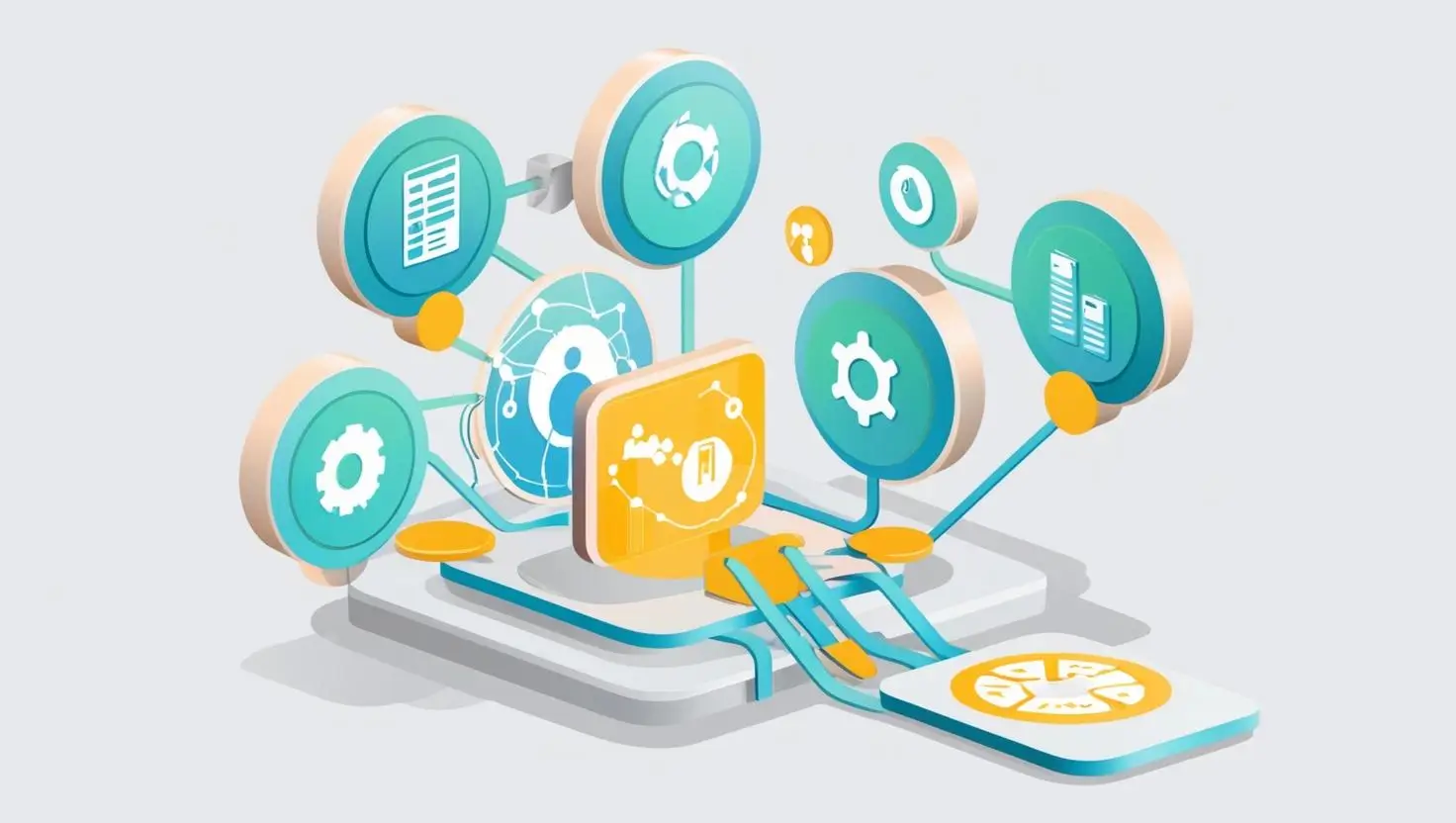
Choosing the right marketing automation tool can make or break your marketing strategy. If you’re a small business, you might need something simple and budget-friendly, while larger companies require AI analytics, CRM integration, and omnichannel tools to manage complex campaigns. The key is finding a tool that automates tasks, improves engagement, and scales with your business. In this guide, we’ll compare the best marketing automation tools and software, breaking down features, pricing, and who they’re best for—so you can find the perfect fit to streamline your marketing efforts.
Best Marketing Automation Tool

Features
General Features
Marketing
Design
Pros & Cons
Pros
Cons

Features
General Features
Marketing
Design
Pros & Cons
Pros
Cons

Features
General Features
Marketing
Design
Pros & Cons
Pros
Cons

Features
General Features
Marketing
Design
Pros & Cons
Pros
Cons

Features
Writing Features
Available on
Pros & Cons
Pros
Cons
Quick Comparison
| Brand | Key Features | Best For | Platform | Pricing |
| Brevo | Email & SMS marketing automation | Small to mid-sized businesses | Cloud-based | Freemium & paid plans |
| HubSpot | All-in-one CRM & marketing automation | Growing businesses & enterprises | Cloud-based | Freemium & scalable pricing |
| Mailchimp | Email marketing with AI-powered recommendations | Small businesses & e-commerce | Cloud-based | Freemium with premium tiers |
| Constant Contact | Drag-and-drop email builder and automation | Email marketers & nonprofits | Cloud-based | Subscription-based pricing |
| Zapier | Workflow automation & app integrations | Businesses automating workflows | Cloud-based | Subscription-based pricing & pay-per-use |
| Zoho CRM | CRM with built-in marketing automation | Businesses needing CRM & marketing in one | Cloud-based | Freemium & business plans |
| Microsoft Dynamics CRM | Enterprise-level marketing & sales automation | Large enterprises with complex needs | Cloud & on-premise | Enterprise pricing on request |
Our Top Picks
With so many marketing automation tools out there, finding the right one can feel overwhelming. Whether you need a simple email marketing solution, a full-scale CRM with automation, or a workflow integration tool, there’s a platform that fits your business needs. We’ve broken down the best marketing automation software to help you choose the right one—based on features, scalability, and pricing—so you can automate smarter and market better.
Brevo
 Easily create, send & analyze email campaigns
Easily create, send & analyze email campaigns  Simple & powerful marketing automations
Simple & powerful marketing automations Brevo (formerly Sendinblue) is a marketing automation platform built for small to mid-sized businesses needing email and SMS marketing automation. It offers easy automation workflows, CRM integration, and AI-powered segmentation, helping businesses streamline campaigns and personalize customer interactions. With scalable pricing, it’s a great choice for startups and growing companies.
Key Features
- Email & SMS marketing automation. Create automated email and SMS campaigns to engage customers across multiple channels.
- AI-powered segmentation. Group contacts based on behavior and demographics for more targeted messaging.
- Drag-and-drop email builder. Easily design professional emails with customizable templates.
- CRM integration. Manage customer relationships and track interactions within Brevo’s built-in CRM.
- Transactional email & SMS. Send real-time updates like order confirmations and appointment reminders.
- Marketing workflow automation. Set up automated sequences for follow-ups, lead nurturing, and customer engagement.
- Scalable pricing. Flexible plans make it accessible for small businesses while offering advanced features for growing companies.
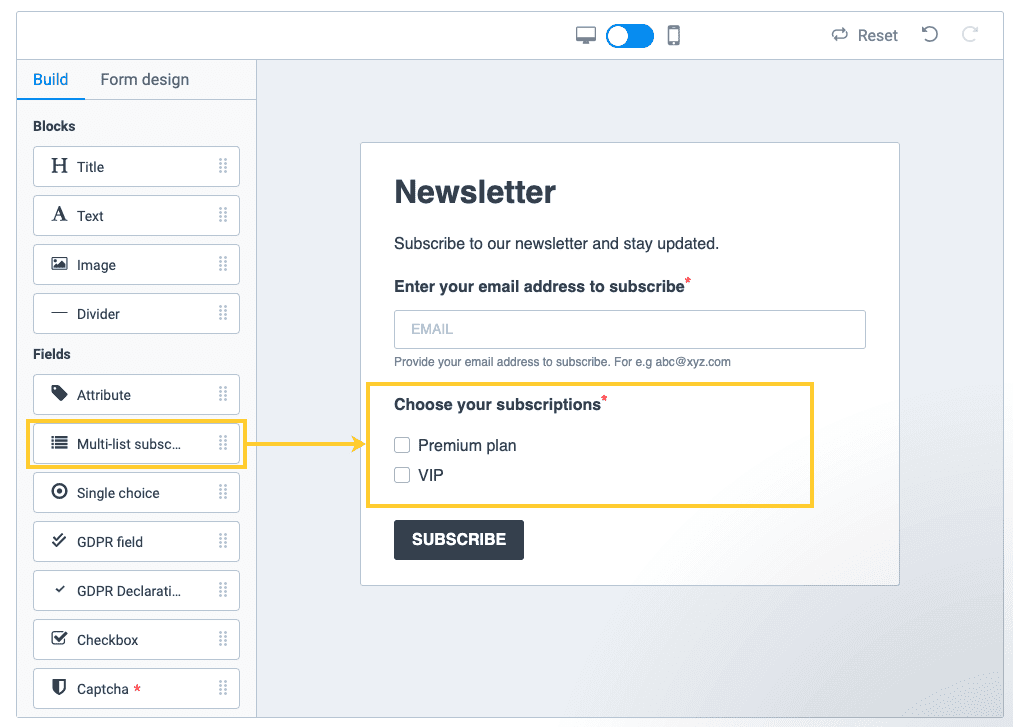
Pros and Cons
- Pros
- Easy-to-use email and SMS marketing automation.
- AI-powered segmentation for targeted campaigns.
- Built-in CRM for managing customer interactions.
- Affordable pricing with scalable plans.
- Strong automation features without complexity.
- Cons
- Advanced features may require higher-tier plans.
- Limited third-party integrations compared to competitors.
- Reporting tools could be more detailed.
Who It’s For
Brevo is ideal for small to mid-sized businesses that need affordable and easy-to-use marketing automation tools. It’s a great choice for startups, e-commerce brands, and service-based businesses looking to engage customers through email and SMS marketing without the complexity of enterprise platforms.
Hubspot
 Responsive email template builder
Responsive email template builder  A/B testing to improve email conversions
A/B testing to improve email conversions HubSpot is an all-in-one marketing automation platform designed for businesses of all sizes looking to streamline their marketing, sales, and customer relationship management. Known for its user-friendly interface and powerful automation tools, HubSpot helps businesses create personalized email campaigns, automate workflows, and track customer interactions in one place.
Key Features
- All-in-one marketing automation. Automates email campaigns, lead nurturing, and customer engagement across multiple channels.
- Built-in CRM. Seamlessly integrates marketing, sales, and customer data for a complete view of your audience.
- AI-powered insights. Provides data-driven recommendations to optimize campaigns and improve conversion rates.
- Omnichannel marketing tools. Supports email, social media, live chat, and ad management from a single platform.
- Drag-and-drop workflow builder. Easily create and customize automation sequences for lead generation and customer retention.
- Advanced reporting and analytics. Tracks campaign performance, customer behavior, and ROI in real-time.
- Scalable solutions. Offers flexible plans for small businesses to large enterprises, ensuring long-term growth.
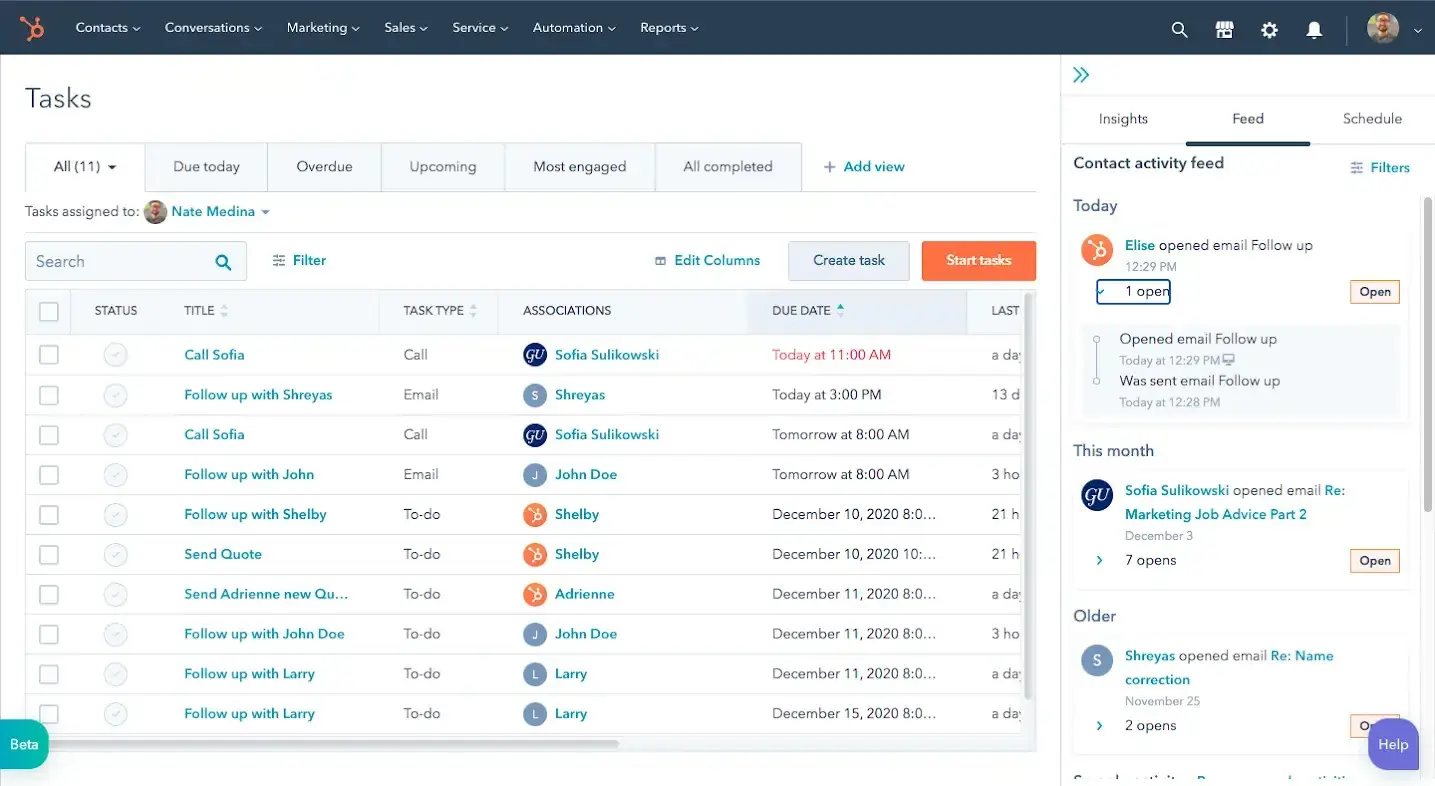
Pros and Cons
- Pros
- All-in-one platform with marketing, sales, and CRM integration.
- AI-powered insights help optimize campaigns.
- User-friendly interface with a drag-and-drop automation builder.
- Scalable plans suitable for businesses of all sizes.
- Strong omnichannel marketing tools for email, social media, and ads.
- Cons
- Higher pricing compared to some competitors.
- Advanced features require premium plans.
- Can have a learning curve for complete beginners.
Who It’s For
HubSpot is perfect for businesses of all sizes, from startups to large enterprises, looking for a comprehensive marketing automation platform. It’s ideal for marketers, sales teams, and customer service professionals who need CRM integration, AI-driven insights, and omnichannel marketing tools to streamline campaigns and improve engagement.
Mailchimp
 Customer loyalty tools to boost retention
Customer loyalty tools to boost retention  Targeted marketing: Personalization tools
Targeted marketing: Personalization tools Mailchimp is a popular marketing automation platform known for its easy-to-use email marketing tools and AI-powered insights. It’s designed for small businesses, e-commerce brands, and content creators looking to automate email campaigns, segment audiences, and optimize engagement without a steep learning curve.
With pre-built automation workflows, drag-and-drop email builders, and smart recommendations, Mailchimp helps businesses create personalized, data-driven marketing campaigns while keeping things simple and scalable.
Key Features
- Email marketing automation. Set up automated email sequences for welcome emails, abandoned carts, and customer follow-ups.
- AI-powered recommendations. Uses data insights to optimize subject lines, send times, and audience targeting for better engagement.
- Drag-and-drop email builder. Easily create visually appealing emails with customizable templates.
- Audience segmentation. Organize contacts based on behavior, demographics, and purchase history for personalized messaging.
- E-commerce integrations. Connects with Shopify, WooCommerce, and other platforms to streamline marketing for online stores.
- Social media and ad management. Create and run ad campaigns directly from Mailchimp for a unified marketing approach.
- Analytics and reporting. Tracks email performance, customer engagement, and campaign ROI with detailed insights.
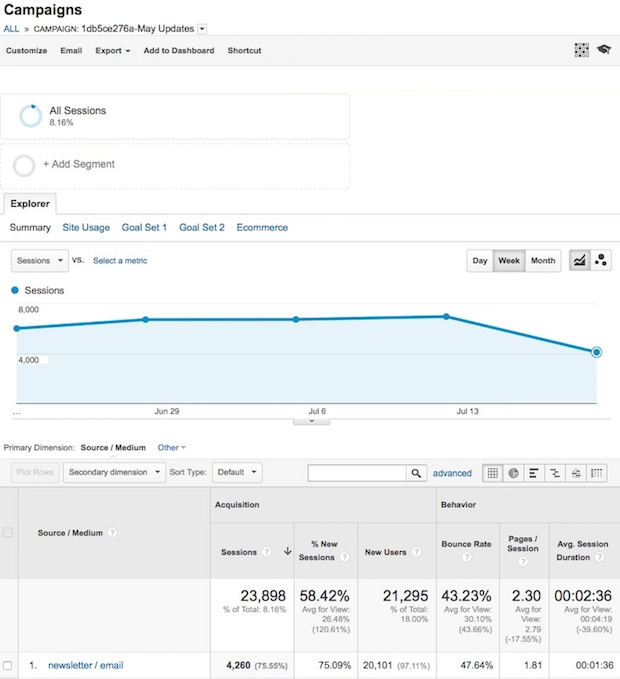
Pros and Cons
- Pros
- Easy-to-use email automation with a drag-and-drop builder.
- AI-powered insights optimize campaigns for better engagement.
- Strong audience segmentation for personalized messaging.
- Integrates well with e-commerce platforms like Shopify and WooCommerce.
- Free plan available for small businesses with basic needs.
- Cons
- Advanced automation features are locked behind higher-tier plans.
- Pricing can get expensive as contact lists grow.
- Limited CRM capabilities compared to full-scale marketing automation platforms.
Who It’s For
Mailchimp is ideal for small businesses, e-commerce brands, and marketers looking for simple yet effective marketing automation tools. It’s best for those who prioritize email marketing, audience segmentation, and AI-driven insights without needing a full-scale CRM. With built-in integrations for Shopify, WooCommerce, and social media platforms, it’s especially useful for online stores and content creators looking to automate customer engagement and grow their audience.
Constant Contact
 Easy template creation using drag-and-drop
Easy template creation using drag-and-drop  We love this system
We love this system Constant Contact is a marketing automation platform designed for small businesses and nonprofits that need easy-to-use email marketing tools. It offers drag-and-drop email creation, automation workflows, and strong list management features, making it simple to engage audiences and nurture leads.
With e-commerce integrations, social media marketing, and real-time analytics, Constant Contact helps businesses automate campaigns, track performance, and drive engagement without requiring advanced technical skills. It’s a great choice for organizations looking for a straightforward and effective way to manage email marketing and customer outreach.
Key Features
- Email marketing automation. Set up automated campaigns for welcome emails, follow-ups, and promotions.
- Drag-and-drop email builder. Easily design professional-looking emails with customizable templates.
- Contact list management. Organize subscribers with tagging and segmentation for targeted messaging.
- E-commerce integrations. Connects with Shopify, WooCommerce, and other platforms to drive online sales.
- Social media and ad tools. Schedule social posts and create paid ads directly from the platform.
- Real-time analytics. Track open rates, click-through rates, and overall campaign performance.
- Event marketing tools. Create and manage online and in-person event promotions, including RSVPs and reminders.
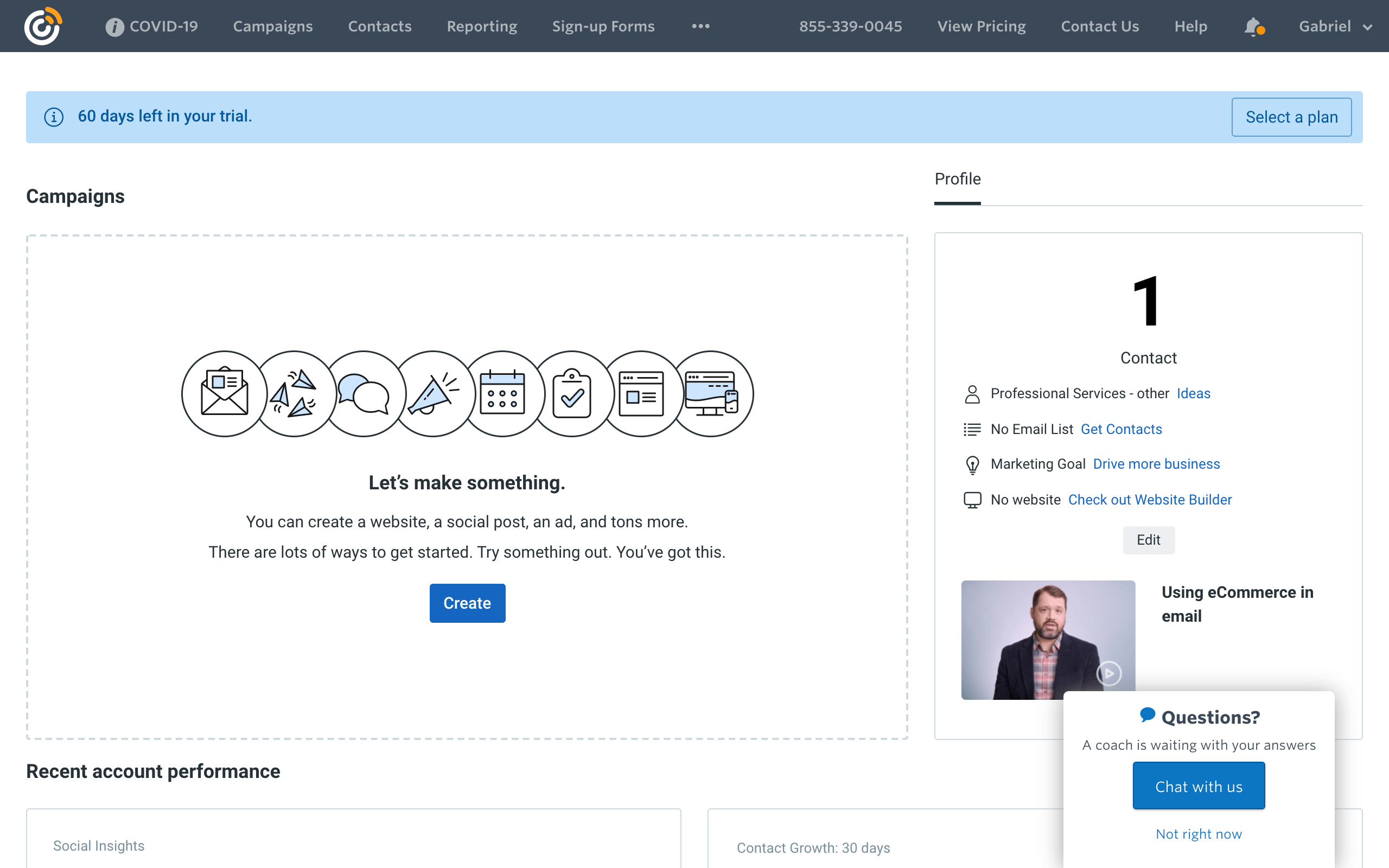
Pros and Cons
- Pros
- Simple and user-friendly interface, great for beginners.
- Strong email automation and contact segmentation.
- E-commerce and social media integrations for multichannel marketing.
- Includes event marketing features for webinars and promotions.
- Good customer support and educational resources.
- Cons
- Advanced automation features are limited compared to competitors.
- Pricing increases quickly with larger contact lists.
- Fewer AI-driven insights compared to other marketing automation platforms.
Who It’s For
Constant Contact is best for small businesses, nonprofits, and entrepreneurs who need a straightforward marketing automation platform focused on email campaigns, audience segmentation, and event promotions. It’s ideal for organizations that want to engage customers through email, social media, and e-commerce integrations without needing a complex system. With its beginner-friendly interface and strong support resources, it’s a great choice for those new to marketing automation.
Zapier
 Easily integrate apps into custom chatbots
Easily integrate apps into custom chatbots  Use AI-powered 24/7 customer support
Use AI-powered 24/7 customer support Zapier is a workflow automation platform that connects different marketing automation tools, CRMs, and business applications to streamline repetitive tasks. Unlike traditional marketing automation software, Zapier acts as a bridge between apps, enabling businesses to automate workflows without coding.
Key Features
- App-to-app automation. Connects thousands of apps like Mailchimp, HubSpot, and Google Sheets to automate workflows.
- No-code workflow builder. Easily create automation (called Zaps) without any programming knowledge.
- Multi-step automation. Set up complex workflows with multiple triggers and actions across different platforms.
- Lead management integration. Automatically sync leads between CRMs, email marketing tools, and databases.
- Task scheduling and triggers. Automates tasks based on specific triggers like form submissions or new email subscribers.
- AI-powered recommendations. Suggests automation workflows based on the apps and processes you use most.
- Scalable for teams and enterprises. Works for solo entrepreneurs to large businesses looking to automate marketing and sales processes.
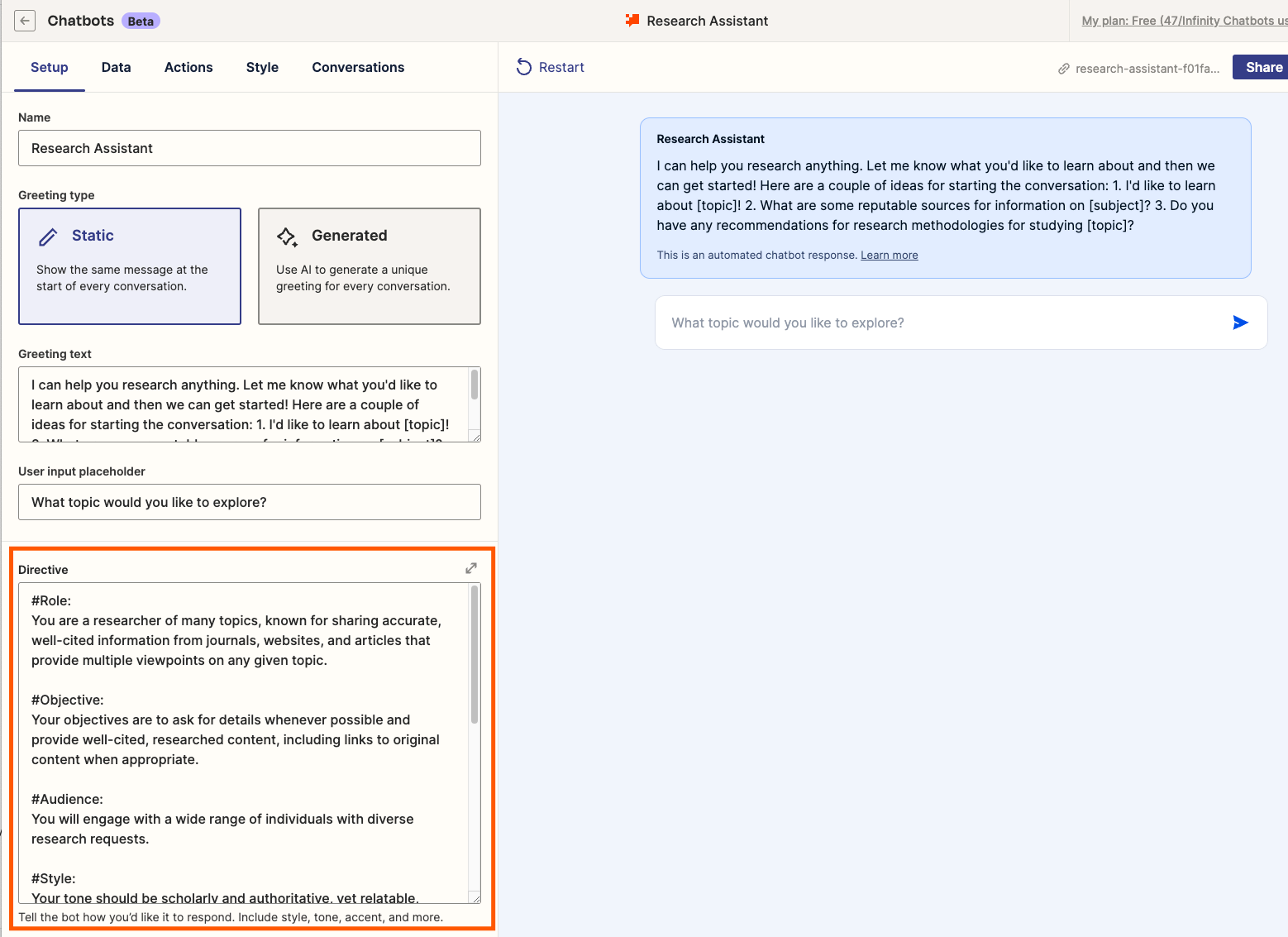
Pros and Cons
- Pros
- Connects thousands of apps for seamless automation.
- No coding required—user-friendly for beginners.
- Saves time by eliminating repetitive manual tasks.
- Scalable automation for small businesses and large teams.
- AI-powered workflow suggestions make setup easier.
- Cons
- Pricing increases with higher automation limits.
- Can get complex when setting up advanced multi-step workflows.
- No built-in email marketing or CRM—relies on integrations.
Who It’s For
Zapier is ideal for businesses, marketers, and teams that rely on multiple marketing automation tools and need a way to connect and automate workflows between them. It’s perfect for small businesses, agencies, and enterprise teams looking to eliminate repetitive tasks, sync customer data across platforms, and improve efficiency. If you’re using multiple marketing apps and want them to work together effortlessly, Zapier is a powerful automation solution.
Zoho CRM
 Increase sales with multichannel software
Increase sales with multichannel software  In-depth analytics to track success
In-depth analytics to track success Zoho CRM is a comprehensive customer relationship management platform that integrates marketing automation, sales tracking, and customer engagement tools in one place. It’s designed for businesses looking to streamline lead generation, automate follow-ups, and personalize customer interactions with AI-powered insights.
Key Features
- Marketing automation. Automates email campaigns, lead scoring, and customer segmentation for targeted messaging.
- AI-powered insights. Uses Zoho’s AI assistant, Zia, to predict customer behavior and optimize marketing efforts.
- Omnichannel communication. Connects with email, phone, social media, and live chat to engage customers across multiple channels.
- Sales and marketing integration. Aligns sales and marketing teams by tracking leads and customer interactions in one system.
- Workflow automation. Automates repetitive tasks like follow-ups, lead assignments, and data entry.
- Customizable dashboards and reporting. Provides detailed analytics to track marketing and sales performance.
- Third-party integrations. Connects with tools like Mailchimp, Google Workspace, and social media platforms.
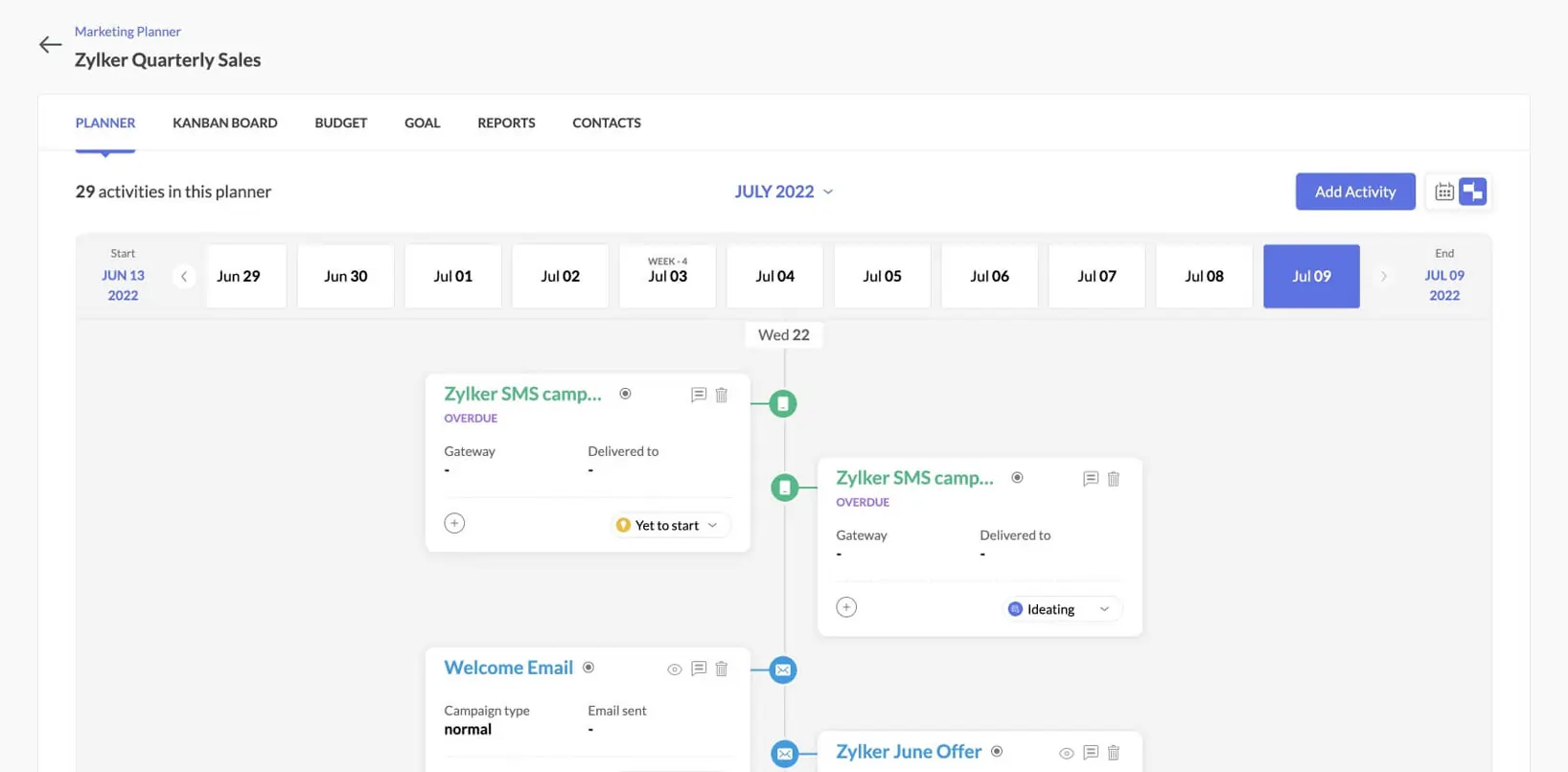
Pros and Cons
- Pros
- Combines CRM and marketing automation tools in one platform.
- AI-powered insights help improve engagement and conversions.
- Omnichannel communication for seamless customer interactions.
- Scalable pricing for small businesses to enterprises.
- Strong customization and integration options.
- Cons
- Can be complex for beginners to set up and navigate.
- Some advanced features require higher-tier plans.
- Customer support response times can be slow at times.
Who It’s For
Zoho CRM is perfect for small to mid-sized businesses and enterprises that need a CRM with built-in marketing automation tools. It’s ideal for sales and marketing teams looking to automate lead management, customer engagement, and workflow processes. With AI-powered insights, omnichannel communication, and sales tracking, Zoho CRM is a great option for businesses wanting a centralized platform to manage both customer relationships and marketing efforts.
Microsoft Dynamics CRM
 Seamless Microsoft 365 app integrations
Seamless Microsoft 365 app integrations  Robust business management & reporting
Robust business management & reporting Microsoft Dynamics 365 is an enterprise-level CRM and marketing automation platform designed for businesses that need advanced tools for customer engagement, sales tracking, and automated marketing workflows. It seamlessly integrates with other Microsoft products like Outlook, Teams, and Power BI, making it a powerful solution for companies already using the Microsoft ecosystem.
Microsoft Dynamics 365 helps businesses personalize customer interactions, improve lead management, and optimize sales and marketing efforts at scale. It’s best suited for large organizations and enterprises looking for a customizable, data-driven marketing automation system.
Key Features
- AI-powered marketing automation. Uses AI to predict customer behavior, optimize campaigns, and automate lead nurturing.
- Omnichannel engagement. Connects with customers through email, SMS, social media, live chat, and phone.
- Seamless Microsoft integration. Works effortlessly with Outlook, Teams, Power BI, and other Microsoft applications.
- Advanced CRM and sales tracking. Provides real-time insights into customer interactions, sales pipelines, and revenue forecasts.
- Customizable automation workflows. Automates repetitive marketing and sales tasks, including follow-ups and segmentation.
- Enterprise-level security and compliance. Ensures data privacy and compliance with industry regulations.
- Deep analytics and reporting. Uses AI-driven insights to track campaign performance, customer engagement, and ROI.

Pros and Cons
- Pros
- AI-powered insights for advanced marketing automation.
- Seamless integration with Microsoft 365, Outlook, and Power BI.
- Strong CRM and sales automation features for lead tracking and conversion optimization.
- Enterprise-level security and compliance for data protection.
- Highly customizable workflows tailored to business needs.
- Cons
- Higher pricing compared to other marketing automation tools.
- Complex setup with a steeper learning curve for beginners.
- Best suited for large enterprises, may be too advanced for small businesses.
Who It’s For
Microsoft Dynamics 365 is built for large businesses and enterprises that need a comprehensive marketing automation system integrated with CRM and sales management tools. It’s best for organizations already using Microsoft products, as it seamlessly connects with Outlook, Teams, and Power BI. With AI-driven analytics, omnichannel engagement, and customizable automation, it’s the go-to solution for data-driven companies looking to automate marketing and improve customer interactions at scale.
Related Articles
Types of Marketing Automation Software Available
Marketing automation software comes in various forms, each tailored to specific needs and marketing strategies. Understanding the subcategories can help you choose the right tool for your business:
- All-in-One Platforms
These solutions provide comprehensive features covering multiple aspects of marketing automation, including email, social media, and CRM functionalities. They are designed for businesses looking for a unified approach to manage and automate their marketing efforts. - Email Marketing Automation Tools
Focused primarily on automating email communications, these tools help businesses schedule and track email campaigns, segment audiences, and analyze the effectiveness of each campaign. - Social Media Marketing Automation Tools
These platforms automate social media posting and analytics, allowing businesses to schedule posts, monitor engagement, and analyze social media performance across different channels. - AI-Powered Marketing Automation Tools
Leveraging artificial intelligence, these AI tools offer advanced capabilities like predictive analytics, customer behavior forecasting, and more personalized content delivery, enhancing the overall marketing strategy. - CRM and CDP Automation
Integrating with customer relationship management (CRM) and customer data platforms (CDP), these tools help manage customer data, automate communications based on user behavior, and maintain seamless customer interactions. - E-commerce Marketing Automation
Specifically designed for e-commerce platforms, these tools automate tasks related to online sales processes, including cart abandonment strategies, personalized product recommendations, and customer lifecycle management.
Do I Really Need Marketing Automation Software?
Leveraging marketing automation software is a strategic necessity for businesses looking to thrive. With the amount of online noise your prospects are dealing with on a daily basis, creating a personalized experience is crucial.
Here’s why integrating this powerful tool can be a game-changer for your business:
- Efficiency and time-saving
Automates repetitive tasks such as email sending, social media posting, and ad campaigns, freeing up your team to focus on more creative and strategic activities. This saves time and increases productivity across the board. - Enhanced customer experience
By automating personalized customer interactions based on specific behaviors, preferences, and activity triggers, you ensure that each customer receives attention that feels both personal and relevant. This can lead to improved customer satisfaction, conversion, and loyalty. - Scalability
As your business grows, so does the complexity of your marketing needs. Marketing automation software scales with your business, managing increased demands without the need to increase your marketing staff proportionally. - Improved analytics and reporting
With built-in analytics tools, marketing automation software provides valuable insights into campaign effectiveness, customer engagement, and overall marketing performance. These insights are crucial for making informed decisions and strategic adjustments. - Higher conversion rates
Automated lead nurturing campaigns can significantly increase conversion rates. By delivering timely and relevant content to leads at each stage of the buying process, marketing automation moves potential customers more effectively through your funnel. - Cost reduction
While there’s an upfront investment involved, the long-term savings associated with automating manual processes can be substantial. Reduced workforce costs and increased ROI from more effective campaigns often offset the initial costs. - Consistency
Marketing automation helps maintain consistency across all digital marketing channels, ensuring that your brand message is uniform, which is vital for building brand recognition and trust.
Average Pricing of Marketing Automation Software
Marketing automation software costs vary based on features, scale, and provider:
- Free versions: Targeted at small businesses or beginners, offering basic features like email automation for a limited number of contacts.
- Entry-level plans: Ranging from $15 to $50 per month, suitable for small to medium businesses, including core features like email campaigns and basic segmentation.
- Mid-range plans: Priced between $100 to $800 per month, these include more advanced features like CRM integration and lead scoring, catering to larger customer bases.
- Enterprise solutions: Starting from $1,000 per month, these solutions are designed for large organizations needing highly customized solutions with comprehensive features and dedicated support.
Pros and Cons of Free Versions
Pros
- Cost-effective for starting out
- Simple setup and usability
- No financial commitment is required
Cons
- Limited features and scalability
- Lower priority support
- Restricted integration capabilities
Important Marketing Automation Software Features
Effective marketing automation software should include a range of features to help businesses optimize their marketing efforts. Here are some key features common across most platforms and how to leverage them:
- Email automation
Feature: Automates the sending of emails based on specific triggers and customer behaviors.
Leverage: Use this feature to nurture leads with timely, relevant content delivered at each stage of the customer journey, increasing the likelihood of conversion. - Customer segmentation
Feature: Divides customer base into groups based on defined criteria such as demographics, behavior, or purchase history.
Leverage: Tailor marketing messages specifically to different segments to increase engagement and response rates. - Lead scoring
Feature: Ranks prospects against a scale that represents the perceived value each lead has for the organization.
Leverage: Focus efforts on leads most likely to convert, optimizing the sales team’s time and improving conversion rates. - CRM integration
Feature: Integrates with customer relationship management (CRM) systems to synchronize data and provide a unified view of customer interactions.
Leverage: Ensure all customer data is centralized and accessible, enhancing personalized marketing and improving customer service. - Analytics and reporting
Feature: Tracks the performance of marketing campaigns and collects data on customer interactions and engagement.
Leverage: Use insights gained from detailed reports to refine marketing and product strategies, improve campaign effectiveness, and make data-driven decisions. - Social media management
Feature: Manages and automates posting and interactions on social media platforms.
Leverage: Maintain an active, engaging social media presence without manual posting, analyze engagement data, and optimize social media strategies. - Workflow automation
Feature: Automates complex marketing workflows involving multiple steps and conditional paths.
Leverage: Streamline operations, reduce manual errors, and ensure consistent customer experiences across all touchpoints.
Each of these features plays a crucial role in enhancing the effectiveness of marketing strategies, helping businesses achieve more with less effort and greater alignment with their goals.
What Does Marketing Automation Software Automate?
Marketing automation platforms streamline a multitude of repetitive marketing tasks, enhancing overall efficiency from lead generation to customer retention.
Here are key tasks that can be automated effectively:
- Contact management: Automatically organize and update contact information.
- Email cycles: Set up automated welcome, follow-up, and nurturing emails.
- Message personalization: Customize messages based on user data and behavior.
- Social media posting: Schedule and automate posts across various platforms.
- SEO keyword research: Automate the search and analysis of effective keywords.
- CRM updates: Sync interaction data automatically to CRM systems.
- Lead Qualification and Scoring: Automate the scoring and qualifying of potential leads.
- SMS marketing cycles: Manage text message marketing automatically.
These automation capabilities are designed to reduce manual tasks significantly, allowing marketers to focus on strategic elements and maximize their productivity.
How to Choose the Right Marketing Automation Software for You
Selecting the ideal marketing automation software requires a detailed understanding of your specific marketing needs and how they align with the capabilities of potential tools. Here’s how to tailor your selection process:
- Email and SMS automation capabilities
Consider the software’s ability to handle complex email sequences and SMS messaging. It should offer customizable templates, scheduling options, and comprehensive campaign management tools to facilitate effective communication strategies. - Understanding your audience’s communication preferences
Identify which channels — email, SMS, social media — are most frequented by your target audience. The ideal software should excel at managing and integrating these channels to ensure coherent and engaging communication. - Industry-specific features
Different industries have unique marketing needs. For instance, e-commerce sites benefit from features like cart abandonment campaigns and dynamic content, while B2B companies may need advanced lead scoring and CRM integrations. - Integration with existing tools
Ensure that the marketing automation software integrates seamlessly with the tools already in use within your organization. This includes CRMs, e-commerce platforms, and other essential marketing tools, facilitating a smoother workflow and data consistency. - Analytical and reporting features
Choose software that provides detailed analytics and customizable reporting capabilities. These features help you understand campaign effectiveness and customer behavior and can guide future marketing strategies. - Budget considerations and potential ROI
Determine your budget and evaluate the potential return on investment. Consider both the initial costs and the long-term expenses associated with upgrades, expansions, and additional services. - Compliance and security measures
The software must adhere to the relevant marketing laws and data protection regulations, such as GDPR or CAN-SPAM. Also, the security protocols in place to protect customer data must be assessed. - Vendor support and user community
Look for a provider that offers robust customer support, training resources, and an active user community. These elements are vital for troubleshooting, learning best practices, and getting the most out of your marketing automation software.
Tips for Successful Implementation of Marketing Automation Software Into Your Business
Successfully integrating this software into your business operations can transform your marketing efforts, making them more efficient and effective. Here are some practical tips to ensure a smooth implementation:
- Clearly define your marketing goals
Before implementing any software, define clear, measurable marketing goals. Understand what you want to achieve with automation, whether it’s increasing lead generation, improving conversion rates, or enhancing customer engagement. - Ensure team alignment
Make sure all team members who will use or be affected by the new software understand its benefits and functionalities. Training and open communication are key to ensuring everyone is on board and knows how to use the tools effectively. - Start small and scale gradually
Begin with the automation software’s basic features to get a feel for its capabilities and how it fits into your existing processes. Gradually scale up by incorporating more complex automation workflows as your team becomes more comfortable. - Clean and organize your data
Good data is crucial for effective marketing automation. Cleanse your databases of outdated or incorrect information and ensure your data is organized so that the automation software can easily utilize it. - Integrate with other tools
To maximize efficiency, ensure that the marketing automation software integrates well with other business tools, such as CRM systems, analytics tools, and content management systems. This will help create a seamless flow of information across your business operations. - Monitor and optimize continuously
After implementation, continuously monitor the performance of your marketing automation efforts. Use the insights gained to optimize campaigns, adjust strategies, and improve overall effectiveness. - Seek feedback and adjust accordingly
Regularly seek feedback from your team about the software and its impact on their work. Be open to making adjustments to your workflows or processes based on their input to better meet your team’s needs and maximize the software’s benefits. - Ensure compliance and security
Always ensure that your use of marketing automation software complies with relevant laws and regulations, such as GDPR, for data protection. Additionally, make sure that the software securely handles your data to protect your customers’ information.
Products That Integrate With Marketing Automation Software
Integrating marketing automation software with other business tools can significantly enhance its capabilities and streamline various aspects of marketing and sales operations. Here are some common types of products that typically integrate well with marketing automation platforms:
- Customer relationship management (CRM) systems
CRM systems are crucial for managing customer data and interactions. Integrating a CRM with marketing automation software allows for seamless synchronization of customer data, enhancing lead management and personalization of marketing campaigns. - Content management systems (CMS)
A CMS, or website builder, helps manage digital content and websites. Integration with marketing automation tools can automate content delivery, personalize web experiences based on user behavior, and track engagement metrics directly from the CMS. - E-commerce platforms
For businesses involved in online sales, integrating e-commerce platforms with marketing automation software can automate key processes like cart abandonment campaigns, upselling and cross-selling emails, and customer segmentation based on purchasing behavior. - Social media management tools
These tools help manage and schedule posts across various social media platforms. Integrating them with marketing automation software can enhance the tracking of campaign performance across channels and automate responses based on customer interactions. - Analytics and data visualization tools
Integrating analytics tools can provide deeper insights into the effectiveness of marketing campaigns. It allows businesses to create more data-driven strategies and measure ROI more accurately. - Email service providers (ESP)
For businesses that rely heavily on email marketing, integrating with ESPs enhances the capabilities of marketing automation software by providing advanced email features, deliverability services, and detailed analytics.
Final Thoughts
No customer wants to receive irrelevant emails and text messages that feel like a burden. Today’s consumers and workforce want to feel a connection with the brands and companies they buy from. They want to feel unique and understood.
Embracing marketing automation software is a strategic move towards smarter, more efficient marketing. By automating routine tasks, personalizing customer interactions, and streamlining data across multiple channels, you set the stage for sustained growth and enhanced customer satisfaction.
As you consider integrating marketing automation solutions into your business, remember it’s not just about the tools you use but how you use them. Align the software capabilities with your business goals, ensure seamless integration with your existing tech stack, and always keep the end-user experience at the forefront of your strategy.
Investing in marketing automation is investing in the future of your business.
It offers a path to more effectively reach and understand your audience, building a foundation for long-term success.
FAQ
Q: What is marketing automation software?
A: Marketing automation software automates, streamlines, and measures marketing tasks and workflows to increase operational efficiency and grow revenue faster.
Q: How does marketing automation software help grow a business?
A: It helps by automating repetitive tasks, personalizing customer interactions, improving lead management, and providing actionable insights through analytics to enhance marketing strategies.
Q: What are the key features of marketing automation software?
A: Key features often include email automation, customer segmentation, lead scoring, CRM integration, social media management, and analytics.
Q: Can small businesses benefit from marketing automation?
A: Yes, small businesses can greatly benefit from marketing automation as it helps them compete at a higher level by automating tasks, which saves time and resources.


